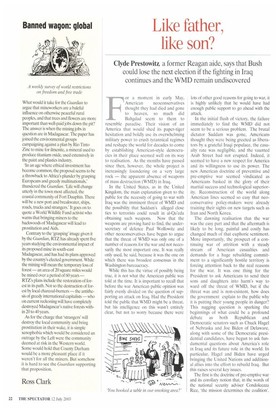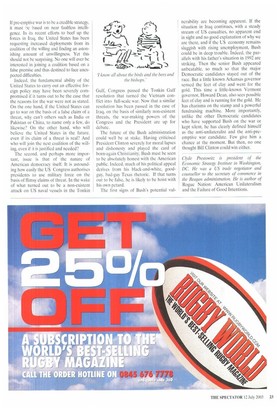Like father, like son?
Clyde Prestowit4 a former Reagan aide, says that Bush could lose the next election if the fighting in Iraq continues and the WMD remain undiscovered
For a moment in early May. American neoconservatives thought they had died and gone to heaven, so much did Bahgdad seem to them to resemble paradise. Their vision of an America that would shed its paper-tiger hesitation and boldly use its overwhelming military power to crush tyrannical regimes and reshape the world for decades to come by establishing American-style democracies in their place seemed well on its way to realisation. As the months have passed since then, however, the whole project is increasingly foundering on a very large rock — the apparent absence of weapons of mass destruction (WMD) in Iraq.
In the United States, as in the United Kingdom, the main explanation given to the public for the necessity of going to war with Iraq was the imminent threat of WMD and the possibility that Saddam's alleged close ties to terrorists could result in al-Qa'eda obtaining such weapons. Now that the weapons are proving hard to find, the undersecretary of defence Paul Wolfowitz and other neoconservatives have begun to argue that the threat of WMD was only one of a number of reasons for the war and not necessarily the most important one. It was really only used, he said, because it was the one on which there was broadest consensus in the Washington bureaucracy.
While this has the virtue of possibly being true, it is not what the American public was told at the time. It is important to recall that before the war American public opinion was fairly evenly divided on the question of supporting an attack on Iraq. Had the President told the public that WMD might be a threat, but his intelligence on this wasn't entirely clear, but not to worry because there were lots of other good reasons for going to war, it is highly unlikely that he would have had enough public support to go ahead with the attack.
In the initial flush of victory, the failure immediately to find the WMD did not seem to be a serious problem. The brutal dictator Saddam was gone, Americans thought they were being greeted as liberators by a grateful Iraqi populace, the casualty rate was negligible, and the vaunted Arab Street had not erupted. Indeed, it seemed to have a new respect for America and its willingness to use its power. The new American doctrine of preventive and pre-emptive war seemed vindicated as Americans basked in the glory of their martial success and technological superiority. Reconstruction of the world along American lines seemed so easy that neoconservative policy-makers were already training their sights on new targets such as Iran and North Korea.
The dawning realisation that the war was the easy part and that the aftermath is likely to be long, painful and costly has changed much of that euphoric sentiment. More importantly, the prospect of a continuing war of attrition with a steady stream of American casualties and demands for a huge rebuilding commitment to a significantly hostile territory is forcing attention back to the real reasons for the war. It was one thing for the President to ask Americans to send their sons and daughters into harm's way to ward off the threat of WMD, but if the threat was and is non-existent, how does the government explain to the public why it is putting their young people in danger? This nagging question is sparking the beginnings of what could be a profound debate as both Republican and Democratic senators such as Chuck Hagel of Nebraska and Joe Biden of Delaware, along with some of the Democratic presidential candidates, have begun to ask fundamental questions about America's role in Iraq and its future role in the world. In particular, Hagel and Biden have urged bringing the United Nations and additional allies into the effort to rebuild Iraq. But this raises several key issues.
The first is the doctrine of pre-emptive war and its corollary notion that, in the words of the national security adviser Condoleezza Rice, 'the mission determines the coalition'. If pre-emptive war is to be a credible strategy, it must be based on near faultless intelligence. In its recent efforts to beef up the forces in Iraq, the United States has been requesting increased deployments from its coalition of the willing and finding an astonishing amount of unwillingness. Yet this should not be surprising. No one will ever be interested in joining a coalition based on a false premise and thus destined to face unexpected difficulties.
Indeed, the fundamental ability of the United States to carry out an effective foreign policy may have been severely compromised if it turns out to be the case that the reasons for the war were not as stated. On the one hand, if the United States can go to war on the basis of a false claim of a threat, why can't others such as India or Pakistan or China, to name only a few, do likewise? On the other hand, who will believe the United States in the future, even if its claim of a threat is real? And who will join the next coalition of the willing, even if it is justified and needed?
The second, and perhaps more important, issue is that of the nature of American democracy itself. It is astounding how easily the US Congress authorises presidents to use military force on the basis of flimsy claims of threat. In the wake of what turned out to be a non-existent attack on US naval vessels in the Tonkin Gulf, Congress passed the Tonkin Gulf resolution that turned the Vietnam conflict into full-scale war. Now that a similar resolution has been passed in the case of Iraq, on the basis of similarly non-existent threats, the war-making powers of the Congress and the President are up for debate.
The future of the Bush administration could well be at stake. Having criticised President Clinton severely for moral lapses and dishonesty and played the card of born-again Christianity. Bush must be seen to be absolutely honest with the American public. Indeed, much of his political appeal derives from his black-and-white, goodguy, bad-guy Texas rhetoric. If that turns out to be false, he is likely to be hoist with his own petard.
The first signs of Bush's potential vul
nerability are becoming apparent. If the situation in Iraq continues, with a steady stream of US casualties, no apparent end in sight and no good explanation of why we are there, and if the US economy remains sluggish with rising unemployment, Bush could be in deep trouble. Indeed, the parallels with his father's situation in 1992 are striking. Then the senior Bush appeared unbeatable, so much so that the major Democratic candidates stayed out of the race. But a little known Arkansas governor sensed the feet of clay and went for the gold. This time a little-known Vermont governor, Howard Dean, also sees possible feet of clay and is running for the gold. He has charisma on the stump and a powerful fundraising machine. More importantly, unlike the other Democratic candidates who have supported Bush on the war or kept silent, he has clearly defined himself as the anti-unilateralist and the anti-preemptive war candidate. Few give him a chance at the moment. But then, no one thought Bill Clinton could win either.
Clyde Presto witz is president of the Economic Strategy Institute in Washington, DC. He was a US trade negotiator and counsellor to the secretary of commerce in the Reagan administration. He is author of Rogue Nation: American Unilateralism and the Failure of Good Intentions.



































































 Previous page
Previous page